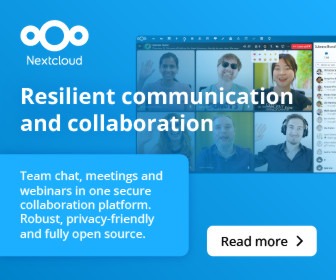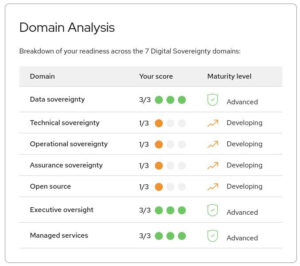FOSS Week in Review
Cops tracking phones sans warrants
 It appears that the police in Tallahassee, Florida have been busy tracking folks by their cell phones without bothering to show up before a judge and ask for a warrant. Why would they violate the constitutional rights of their citizens this way? Evidently because they were using technology on loan and had signed a non-disclosure agreement.
It appears that the police in Tallahassee, Florida have been busy tracking folks by their cell phones without bothering to show up before a judge and ask for a warrant. Why would they violate the constitutional rights of their citizens this way? Evidently because they were using technology on loan and had signed a non-disclosure agreement.
According to Wired, this information came to light in an appeal of a sexual battery case dating back to 2008 in which a suspect was tracked using the technology to locate a phone that had been stolen from the victim. The police have admitted using the device 200 times, with no judge or warrant involved, since 2010. In a blog post made Monday, the ACLU said the device is “likely a Stingray made by the Florida-based Harris Corporation.” Evidently, the ACLU has long suspected that Harris has been loaning the devices to Florida police departments.
“The ACLU now suspects these police departments may have all signed non-disclosure agreements with the vendor and used the agreement to avoid disclosing their use of the equipment to courts.
“‘The police seem to have interpreted the agreement to bar them even from revealing their use of Stingrays to judges, who we usually rely on to provide oversight of police investigations,’ the ACLU writes.”
Although the Tallahassee police evidently paid nothing to borrow the devices, they’re quite costly. Wired estimates the price on the Stingray at $75,000, with an additional $22,000 to $5,000 for the software to make it work.
Ubuntu will continue to use MySQL
We’ve learned from Steven J. Vaughan-Nichols at ZDNet that Mark Shuttleworth has said in a Google+ posting that Ubuntu will stick with MySQL as the distros default database for the time being.
“One major reason why Ubuntu is sticking with Oracle’s MySQL is that Oracle made the effort to get MySQL 5.6 to work properly with Debian and Ubuntu. Yngve Svendsen, Oracle’s Director of MySQL Engineering Services, apologized in a blog posting for Oracle’s neglect of some Linux distributions in the past. Svendsen wrote, ‘We closed a gaping hole in our distribution on Linux.'”
It appears that the fact that most other distros have moved to adopt MariaDB, a MySQL fork, as a drop-in replacement hasn’t escaped the folks at Oracle and they’ve been scrambling to do some damage control.
“The Norwegian-based developer explained, ‘When you’re upstream, you can easily lapse into a mode where you stop listening properly to those who sit downstream and have to process what you’re releasing.'”
 This is probably a “too little, too late” situation for Oracle. Certainly, most open source projects would rather work with an application being developed by an open source house and not by a proprietary outfit such as Oracle. MariaDB comes to the table with a lot of credibility, as it’s being developed under the careful guidance of Monty Widenius, one of the original developers of MySQL.
This is probably a “too little, too late” situation for Oracle. Certainly, most open source projects would rather work with an application being developed by an open source house and not by a proprietary outfit such as Oracle. MariaDB comes to the table with a lot of credibility, as it’s being developed under the careful guidance of Monty Widenius, one of the original developers of MySQL.
MySQL was acquired by Sun Microsystems for $1 billion in 2008. The database ended-up under Oracle’s control in 2010, with the acquisition of Sun.
Old banking domains used by spammers and worse
Did your back go broke or merge with another bank during the last ten years or so? If so, we’d recommend that you not go back to visit their old website for old times sake. From what we’ve learned from the BBC, that might be an invitation for a malware party on your computer.
“Almost 3,200 US banks have shut up shop over the last decade, according to the research by Prof Tyler Moore from the Southern Methodist University in Dallas and Dr Richard Clayton from the University of Cambridge.
“About one-third of the domains the banks used, 1,030 sites, have now passed into the hands of people who are abusing their formerly good reputation, found the research.”
According to the Beeb, the bad guys are using the domains because of their pristine reputation. They’re being used to spread spam, influence search results and for drive-by malware attacks.
Special FOSS Force discount for Great Wide Open
Readers of FOSS Force who want to attend Great Wide Open, the enterprise level open source conference that will be held April 2nd and 3rd in downtown Atlanta, might want to know they can grab an attractive discount just by using our name.
The folks at IT-oLogy, the organization behind the event, are offering FOSS Force visitors 50% off the early bird price, meaning you can attend both days for $75 or one day for $50–what a deal! All that’s necessary to take advantage of this offer is to type “fossforce” (without the quotes) into the promotional code box when you register on their website. You should hurry, however, as this offer ends on March 19th.
Why Johnny won’t trade XP for Windows 8.1
Microsoft has spent the last six months or so working hard to get XP users to upgrade, which doesn’t seem to be happening in any significant way. An interesting article by Joel Hruska on HotHardware.com explains in detail why Redmond is having a time convincing these users to give it up for a newer version of Windows.
“According to Gene Grabowski, an executive vice president with PR management firm Levick, this disaster was predictable. Microsoft has misjudged how strong its relationship is with consumers and failed to acknowledge its own shortcomings. Not providing an upgrade utility is one example — but so is the general lack of attractive upgrade prices or even the most basic understanding of why users haven’t upgraded.”
Microsoft was never very good at listening to the concerns of their user base. They’ve always been too busy telling them what to do.
Meanwhile, over at BGR, Brad Reed is of the opinion that Microsoft might be planning on using Windows 9 as their “secret weapon” to lure lagging XP users.
‘Microsoft knows that Windows 8 is a nonstarter for many XP users, which is why it’s apparently designed Windows 9 with the desktop user much more in mind. The company began its efforts to appease desktop PC users with Windows 8.1 — which added back a Start button and the option of booting up to desktop — and it’s only going further down this road with its next major release.’
There’s a problem, however, as Windows 9 isn’t slated for release until this fall at the earliest and might not be released until sometime in 2015. This would leave diehard XP users unpatched and unprotected for months, possibly a year, before Redmond offers up a palatable replacement, assuming that XP users find 9 palatable
More wintry weather this week. Snow and sleet on Monday and snow, sleet and freezing rain last night, making for an icy mess today. Oh, well…tomorrow springlike temps return. Until our next Week in Review, may the FOSS be with you…
















Just thinking,….could it be a case of too little-too late for MS? A lot of people I know and some companies I’ve worked with have already made a switch to Linux, and I don’t think they’re waiting for Windows 9 to switch back. And since I live in a small town in PA and don’t represent the millions of PC users out there I can’t be considered even a drop in the bucket of Microsoft’s customers, but what about those companies that have made the switch? or are in the process of doing so? Does anyone think they’re spending all this time making the jump, only to jump BACK when Windows 9 comes?….